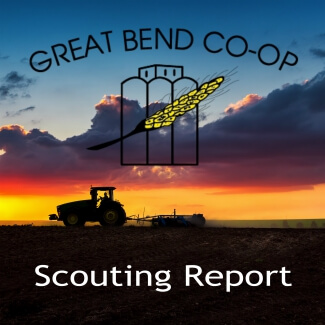Scouting Report - June 17, 2019
Jun 17, 2019

Alfalfa – Alfalfa looks good throughout the area. Starting to see some pigweeds and other summer annual weeds in fields not treated with a residual this winter. Consider tissue testing to get an idea of nutrient levels in your alfalfa.
Wheat – Seeing a lot of Fusarium Head Blight also know commonly as Head Scab. As we are moving into later growth stages, wheat cannot be treated but should be monitored for infection, especially on seed wheat fields. Infection can occur anytime from flowering through early dough stages as long as conditions are favorable. Infect seed, when plant, will show poor germination and slow emergence. Symptoms of infection includes bleaching of some or all of the spikelet while the head is still green and affected kernels will appear shrunken and discolored.
Corn – Corn ranges anywhere from Emergence to 8 Leaf Stage. Corn color seems to be improving as many fields are reaching a rapid growth stage and roots are exploring more of the soil. Fungicide application around V5 can help reduce stress. At this stage, kernels around the ear are being set, so stress now can have a negative effect on final yield. The second application of many PRE herbicides is being applied at this stage and fungicide can often be added to the tank to avoid a separate application.
Soybeans – Soybeans are mostly planted throughout the territory and now range from Emergence to V4 (or 4 Trifoliate). Earlier planted soybeans are looking pretty good. Starting to see some weeds pushing through the early PRE products. Understanding what variety of soybeans you have planted and what traits they include is crucial in making POST herbicide application decisions. Consider adding an additional residual product with the early POST applications to extend weed control beyond the initial burndown of present weeds. Starting to see some insect feeding on leaves, but well below treatment levels so far.
Milo – Milo being planted throughout the area now. Timing of PRE products is very important in milo. Many producers add burndown or fertilizer to the PRE products, so application before crop emergence is crucial. Plan ahead and communicate with the co-op or your applicator to be prepared to apply your herbicide as soon as possible as the field is planted.
Harvest Safety - With wheat harvest quickly approaching, we urge producers to review harvest safety with all members of your harvest crew. For starters: check locations and status of fire extinguishers, discuss and review policies for dealing with equipment malfunctions, and make plans for rotating hours so avoid harvesting while drowsy. Check tire pressure on machinery and make sure that traps on grain trailers are greased and easy to open and close. Making plans for an emergency may seem like a discouraging or negative task, but can save lives if an accident should occur.
Wheat – Seeing a lot of Fusarium Head Blight also know commonly as Head Scab. As we are moving into later growth stages, wheat cannot be treated but should be monitored for infection, especially on seed wheat fields. Infection can occur anytime from flowering through early dough stages as long as conditions are favorable. Infect seed, when plant, will show poor germination and slow emergence. Symptoms of infection includes bleaching of some or all of the spikelet while the head is still green and affected kernels will appear shrunken and discolored.
Corn – Corn ranges anywhere from Emergence to 8 Leaf Stage. Corn color seems to be improving as many fields are reaching a rapid growth stage and roots are exploring more of the soil. Fungicide application around V5 can help reduce stress. At this stage, kernels around the ear are being set, so stress now can have a negative effect on final yield. The second application of many PRE herbicides is being applied at this stage and fungicide can often be added to the tank to avoid a separate application.
Soybeans – Soybeans are mostly planted throughout the territory and now range from Emergence to V4 (or 4 Trifoliate). Earlier planted soybeans are looking pretty good. Starting to see some weeds pushing through the early PRE products. Understanding what variety of soybeans you have planted and what traits they include is crucial in making POST herbicide application decisions. Consider adding an additional residual product with the early POST applications to extend weed control beyond the initial burndown of present weeds. Starting to see some insect feeding on leaves, but well below treatment levels so far.
Milo – Milo being planted throughout the area now. Timing of PRE products is very important in milo. Many producers add burndown or fertilizer to the PRE products, so application before crop emergence is crucial. Plan ahead and communicate with the co-op or your applicator to be prepared to apply your herbicide as soon as possible as the field is planted.
Harvest Safety - With wheat harvest quickly approaching, we urge producers to review harvest safety with all members of your harvest crew. For starters: check locations and status of fire extinguishers, discuss and review policies for dealing with equipment malfunctions, and make plans for rotating hours so avoid harvesting while drowsy. Check tire pressure on machinery and make sure that traps on grain trailers are greased and easy to open and close. Making plans for an emergency may seem like a discouraging or negative task, but can save lives if an accident should occur.